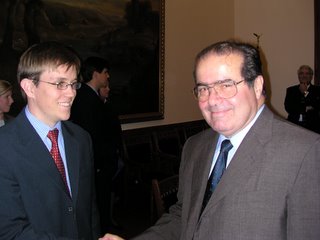
I must say I'm rather pleased with what I've heard about Judge Alito. He seems a reasonable sort, hated by all the proper factions (People for the American Way, Lambda Legal, etc.). Indeed, if the accounts I've read of his dissent in the machine-gun case are accurate, he was an early supporter of the new federalism, which is almost more than I can say for Scalia at this point. Witness how admiringly I gaze on his august countenance, unaware of the treachery that lurks in his heart even then, but I digress. In any case, the replacement of O'Connor with someone willing to constrain the subject matter of federal regulation would have no net effect, since she herself was one of the dissenters in Raich. It is, rather, on individual rights issues that we could probably expect better things from Alito than O'Connor.
One of the cases I've seen mentioned in the news as being one in which Alito's participation could alter the result is Rumsfeld v. Forum for Academic and Institutional Rights, a case out of Alito's own Third Circuit, but on whose panel he did not sit. The case is not, as FOX News claims, "a gay rights appeal that involves the Pentagon's 'don't ask, don't tell' policy." The legal issues have little to do with the military's policy on homosexuality, and nothing whatsoever to do with "gay rights." It is, rather, a First Amendment free expression case, challenging the Solomon Amendment, which conditions the receipt of federal funds by academic institutions on their granting military recruiters the same access and favor as the institutions give to other employers. Needless to say, most fashionable universities want nothing to do with the military, and resent being obliged to facilitate military recruiting in any way. In particular (and this is where the ignorant might derive the notion that homosexuality is somehow at issue), the plaintiff universities complain that allowing military recruiters on campus dilutes their message of tolerance and inclusiveness, because the military won't hire overt homosexuals. I suspect the outcome will depend on whether the Court buys the distinction the Third Circuit draws between this case and the National Library Association one decided in 2003.
But I would like to air one misgiving I have about Alito's opinions, as reported by newspapermen, which is his purported indulgence toward free exercise claims, and reluctance to apply the standard set forth in Employment Division v. Smith. Smith, as everyone knows, was the one involving religious use of peyote by members of the "Native American Church," and established the standard under which courts review claims that government is prohibiting a person's free exercise of religion, in violation of the first and fourteenth amendments to the Constitution. The case arose out of the plaintiff's being fired from his job for using peyote, and subsequently denied unemployment benefits by the state of Oregon. The case was only decided by the Supreme Court after the Oregon Supreme Court determined that state law prohibited the use of peyote entirely, with no exception for religious use. Consequently, the reasoning of Scalia's opinion is directed largely at the validity of this broader prohibition, rather than at the issue of unemployment benefits, on a sort of greater-includes-the-lesser theory. Scalia held that the Constitution does not prohibit states from enacting laws that place incidental burdens on religious activity. As he reasoned, religious activity potentially includes every sort of activity, and so carving out exceptions for every religious practitioner either makes every man a law unto himself, or places courts in a role that would almost certainly be repugnant to the framers--of deciding what is legitimate religious practice and what isn't. Instead, the Court held, the standard should only be one of whether government, in enacting the law, intended to place a burden on the practice of religion. This standard also has the advantage of requiring courts to perform a function to which they are better suited: lawyers are lousy at making policy decisions about whether a government objective is more important than the religious practices of individuals, but they are well-trained in determining the purpose of laws.
The new standard didn't sit well with a large section of the public, and therefore with elected politicians. The Congress passed the "Religious Freedom Restoration Act," which purported to ratchet the free exercise standard up to include the old effects test. But the Court rebuked it in City of Boerne v. Flores, holding that, because the Constitution does not protect free exercise against incidental infringements, Congress was not acting under its Fourteenth Amendment powers when it enacted the R.F.R.A., which was not supported by any other power and consequently invalid as ultra vires. (Cf. my earlier post on Tennessee v. Lane.) Evangelicals still don't like the decision, however, which is probably why social conservatives are proclaiming with such relish that Alito doesn't like it either. I don't really care as a matter of outcomes--O'Connor was the only justice really to bail on Smith when it came down to deciding Boerne, so Alito's appointment won't change anything even if he doesn't like Smith. But I do actually care about the shift from "balancing" to "intent" tests, which I consider one of the most significant contributions to judicial sanity by the Rehnquist court, and one that might be furthered by O'Connor's absence. Indeed, the only way I can begin to forgive Scalia for concurring in Raich is by telling myself that he did it all in the interest of returning to a purpose-driven analysis to the enumeration of powers (though a somewhat muddle-headed one), but the road to reconciliation will be long.

0 Comments:
Post a Comment
<< Home